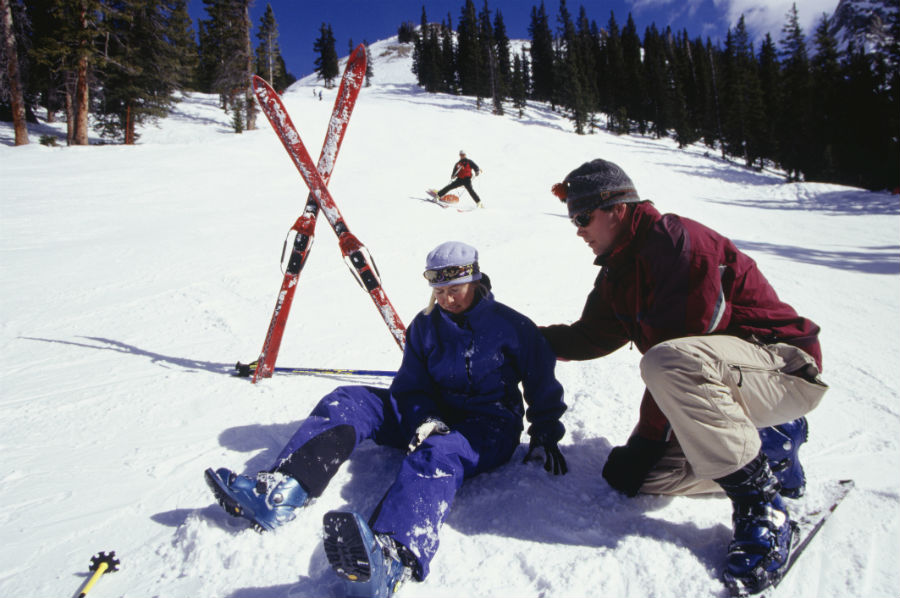Tips for Preventing Winter Sports Injuries in Colorado
Sports Injuries
•
Mar 2, 2018

One of the best parts about winter in Colorado are the many ways you can enjoy the snow. From snowboarding and skiing, to tubing and sledding, there is a fun winter sport for just about everyone. Unfortunately, winter sports all too often carry the potential for injury. One study found that more than 246,000 people were treated for a winter sports-related injury in 2015.
The most common injuries winter sport athletes are treated for include different kinds of sprains, strains, fractures and head injuries. More specifically, skiing and snowboarding are linked to a high volume of concussions, ACL and rotator cuff injuries. Some injuries are unavoidable due to the inherent risk of these activities, but there are some ways to help prevent these kinds of injuries from occurring that families planning on hitting the slopes should be aware of.
Utilize Proper Gear and Equipment
Before participating in any winter sport, be sure to wear the recommended safety gear. Due to the high speeds experienced by skiers and snowboarders, helmets, goggles and fitted boots should always be worn to prevent head injuries, serious eye problems caused by debris or ankle twists and sprains.
It’s also important to use gear that’s in good condition. For example, skis and snowboards should be properly waxed and fitted with quality bindings, and boots, helmets and other wearables need to be the right size. Always purchase gear from reputable stores or dealers to avoid running into gear-related problems.
Stay Within Your Skill Level
This is especially vital for athletes who like to push themselves and those who are inexperienced. You’re at a much higher risk for injury if you attempt a trail that’s outside of your comfort level. Inexperienced people should consider enrolling in at least an introductory class before hitting the slopes so they can learn proper safety and technique.
Even seasoned enthusiasts need to be honest with themselves regarding their skill level. That includes recognizing when it’s time for a break or when to call it quits for the day. Overworking your body when it’s fatigued will almost certainly lead to a muscle cramp, sprain or something more serious.
Increase Your Flexibility
As with any sport or recreational activity, a good stretch or warm up activity will help your body respond to all the twists and turns felt while skiing or snowboarding. Keep in mind, muscles are more susceptible to injury when they’re cold and tight. Because you’re in the snow, it’s crucial to keep your body loose and thoroughly warmed up throughout the day and especially in between runs.
Follow the Trail and Mountain Rules
Never go outside trail boundaries. Areas that haven’t been designed or modified for use often have dangerous hazards like boulders, trees and ice that the vast majority of skiers and snowboarders aren’t equipped to handle. Furthermore, always follow any rules or regulations the ski area has posted, such as trail closures. They’re there for a reason!
Use Proper Technique
Winter sports techniques were created in part for safety. Neglecting proper ski or snowboard techniques could be the difference between a safe, fun run and a severe injury. Always consult a professional or enroll in a class if you have questions or are unfamiliar with how to get started.
Additional General Tips
Even if you’re not hitting the slopes too hard, there’s still the risk for a variety of injuries or general health concerns when you’re on the hills. Here are some things to keep in mind:
- Wear sunscreen, even on overcast days
- Always wear a properly fitted helmet designed for the sport
- Stay hydrated, even if you don’t feel thirsty
- Dress for cold weather with several loose layers
- Pay attention to storm warnings
- Never participate in winter sports alone
Don’t Ignore Seemingly Minor Injuries
It’s essential to do what you can to prevent injuries from occurring, but it’s equally as critical to recognize when you’ve sustained an injury and when it’s time to seek treatment. Ignoring seemingly minor injuries can often exacerbate and cause them to be more damaging in the long run. Plus, small injuries can be worse than they initially seem.
The trusted health care professionals at Complete Care’s Urgent Cares and ERs provide emergency and routine care for athletes in Colorado Springs and throughout Texas. For more information or to schedule an appointment with Complete Care, call (719) 247-1999 or visit us online today!
